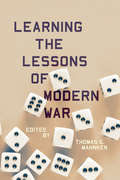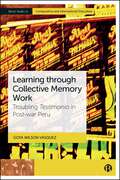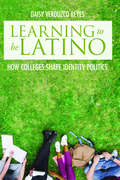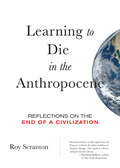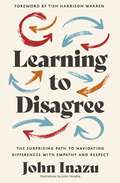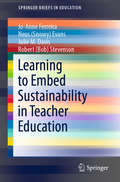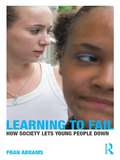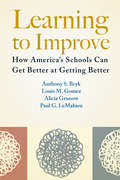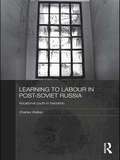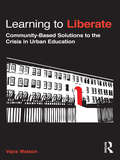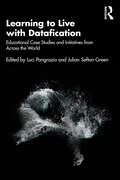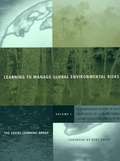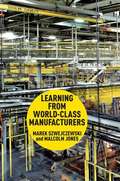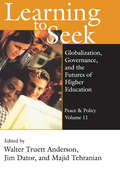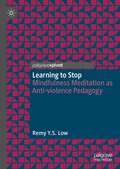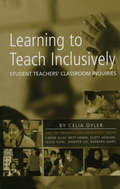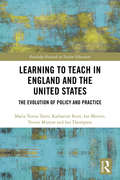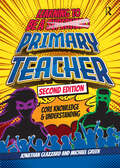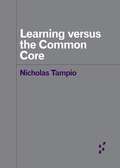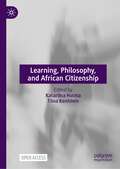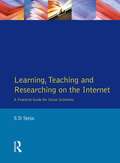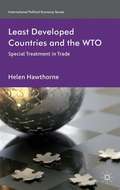- Table View
- List View
Learning the Lessons of Modern War
by Thomas G. MahnkenLearning the Lessons of Modern War uses the study of the recent past to illuminate the future. More specifically, it examines the lessons of recent wars as a way of understanding continuity and change in the character and conduct of war. The volume brings together contributions from a group of well-known scholars and practitioners from across the world to examine the conduct of recent wars in Iraq, Afghanistan, the Middle East, South America, and Asia. The book's first section consists of chapters that explore the value of a contemporary approach to history and reflect on the value of learning lessons from the past. Its second section focuses on the wars in Iraq and Afghanistan. Chapters on Iraq discuss the lessons of the Iraq War, the British perspective on the conflict, and the war as seen through the lens of Saddam Hussein's military. Chapters on Afghanistan discuss counterinsurgency operations during the war, Britain's experience in Afghanistan, raising and training Afghan forces, and U.S. interagency performance. The book's third section examines the lessons of wars involving Russia, Israel, Sri Lanka, the Philippines, Georgia, and Colombia. It concludes by exploring overarching themes associated with the conduct of recent wars. Containing a foreword by former National Security Advisor Lieutenant General H.R. McMaster, Learning the Lessons of Modern War is an indispensable resource for international relations and security studies scholars, policymakers, and military professionals.
Learning through Collective Memory Work: Troubling Testimonio in Post-war Peru (Bristol Studies in Comparative and International Education)
by Goya Wilson VásquezThis book traces the process of producing testimonio with the children of the Tupac Amaru Revolutionary Movement (MRTA), an insurgent group during Peru’s internal war (1980–2000). It examines how the group navigates post-war struggles over memory while dealing with the ‘children of terrorists’ stigma. Drawing from a cycles of inquiry approach, the book theorizes three movements for memory work: a realist presentation of testimonial narratives, a ‘politics of memory’ engaging with the conditions of production and a ‘poetics of memory’ that troubles memory, voice and representation for qualitative inquiry in post-war contexts. Challenging the notion of war-torn countries as pure devastation, the author invites readers to see them as sites of knowledge and creativity, with much to offer for education, peace studies and social justice research.
Learning to Be Latino: How Colleges Shape Identity Politics (Critical Issues in American Education)
by Daisy Verduzco ReyesIn Learning to Be Latino, sociologist Daisy Verduzco Reyes paints a vivid picture of Latino student life at a liberal arts college, a research university, and a regional public university, outlining students’ interactions with one another, with non-Latino peers, and with faculty, administrators, and the outside community. Reyes identifies the normative institutional arrangements that shape the social relationships relevant to Latino students’ lives, including school size, the demographic profile of the student body, residential arrangements, the relationship between students and administrators, and how well diversity programs integrate students through cultural centers and retention centers. Together these characteristics create an environment for Latino students that influences how they interact, identify, and come to understand their place on campus. Drawing on extensive ethnographic observations, Reyes shows how college campuses shape much more than students’ academic and occupational trajectories; they mold students’ ideas about inequality and opportunity in America, their identities, and even how they intend to practice politics.
Learning to Die in the Anthropocene
by Roy Scranton"In Learning to Die in the Anthropocene, Roy Scranton draws on his experiences in Iraq to confront the grim realities of climate change. The result is a fierce and provocative book."--Elizabeth Kolbert, Pulitzer Prize-winning author of The Sixth Extinction: An Unnatural History"Roy Scranton lucidly articulates the depth of the climate crisis with an honesty that is all too rare, then calls for a reimagined humanism that will help us meet our stormy future with as much decency as we can muster. While I don't share his conclusions about the potential for social movements to drive ambitious mitigation, this is a wise and important challenge from an elegant writer and original thinker. A critical intervention."--Naomi Klein, author of This Changes Everything: Capitalism vs. the Climate Coming home from the war in Iraq, US Army private Roy Scranton thought he'd left the world of strife behind. Then he watched as new calamities struck America, heralding a threat far more dangerous than ISIS or Al Qaeda: Hurricane Katrina, Superstorm Sandy, megadrought--the shock and awe of global warming.Our world is changing. Rising seas, spiking temperatures, and extreme weather imperil global infrastructure, crops, and water supplies. Conflict, famine, plagues, and riots menace from every quarter. From war-stricken Baghdad to the melting Arctic, human-caused climate change poses a danger not only to political and economic stability, but to civilization itself . . . and to what it means to be human. Our greatest enemy, it turns out, is ourselves. The warmer, wetter, more chaotic world we now live in--the Anthropocene--demands a radical new vision of human life.In this bracing response to climate change, Roy Scranton combines memoir, reportage, philosophy, and Zen wisdom to explore what it means to be human in a rapidly evolving world, taking readers on a journey through street protests, the latest findings of earth scientists, a historic UN summit, millennia of geological history, and the persistent vitality of ancient literature. Expanding on his influential New York Times essay (the #1 most-emailed article the day it appeared, and selected for Best American Science and Nature Writing 2014), Scranton responds to the existential problem of global warming by arguing that in order to survive, we must come to terms with our mortality.Plato argued that to philosophize is to learn to die. If that's true, says Scranton, then we have entered humanity's most philosophical age--for this is precisely the problem of the Anthropocene. The trouble now is that we must learn to die not as individuals, but as a civilization.A war veteran, journalist, author, and Princeton PhD candidate, Roy Scranton has published in the New York Times, Wall Street Journal, Rolling Stone, Boston Review, and Theory and Event, and has been interviewed on NPR's Fresh Air, among other media.imes. This compressed, essential text offers both uncomfortable truths and unexpected joy."--McKenzie Wark, author of Molecular Red: Theory for the Anthropocene
Learning to Disagree: The Surprising Path to Navigating Differences with Empathy and Respect
by John InazuAre you discouraged by our divided, angry culture, where even listening to a different perspective sometimes feels impossible? If so, you're not alone, and it doesn't have to be this way. Learning to Disagree reveals the surprising path to learning how to disagree in ways that build new bridges with our neighbors, coworkers, and loved ones--and help us find better ways to live joyfully in a complex society.In a tense cultural climate, is it possible to disagree productively and respectfully without compromising our convictions? Spanning a range of challenging issues--including critical race theory, sexual assault, campus protests, and clashes over religious freedom--highly regarded thought leader and law professor John Inazu helps us engage honestly and empathetically with people whose viewpoints we find strange, wrong, or even dangerous.As a constitutional scholar, legal expert, and former litigator, John has spent his career learning how to disagree well with other people. In Learning to Disagree, John shares memorable stories and draws on the practices that legal training imparts--seeing the complexity in every issue and inhabiting the mindset of an opposing point of view--to help us handle daily encounters and lifelong relationships with those who see life very differently than we do.This groundbreaking, poignant, and highly practical book equips us to:Understand what holds us back from healthy disagreementLearn specific, start-today strategies for dialoguing clearly and authenticallyMove from stuck, broken disagreements to mature, healthy disagreementsCultivate empathy as a core skill for our personal lives and our whole society If you are feeling exhausted from the tattered state of dialogue in your social media feed, around the country, and in daily conversations, you're not alone. Discover a more connected life while still maintaining the strength of your convictions through this unique, often-humorous, thought-provoking, and ultimately life-changing exploration of the best way to disagree.
Learning to Embed Sustainability in Teacher Education (SpringerBriefs in Education)
by Julie M. Davis Jo-Anne Ferreira Neus (Snowy) Evans Robert (Bob) StevensonThis book offers an accessible guide to understanding the importance of a systems approach to embedding sustainability into teacher education practice, providing a practical resource for teacher education academics and others with an interest in organisational change. It draws principally on the findings of a 12-year research project in Australia, working directly with academics and their teacher education institutions to ensure that sustainability and education for sustainability are embedded in teacher education courses. Illustrating the need for change in teacher education in the context of education for sustainability, the book discusses the theory underpinning and practical application of a system-based change model. It also offers examples of how the model has been used in practice and shows education academics how to implement change within their own organizations and use the ideas and tools presented to advance sustainability in their discipline areas.
Learning to Fail: How Society Lets Young People Down
by Fran AbramsDuring a decade of relative prosperity from the mid-1990s onward, governments across the developed world failed to crack one major issue – youth unemployment. Even when economic growth was strong, one young person in 10 in the United Kingdom was neither working nor learning. As the boom ended, the number of young people dropping out after leaving school – already acknowledged to be too high - began to rise at an alarming rate. As governments face up to the prospect of a new generation on the dole, this book examines the root causes of the problem. By holding a light to the lives and attitudes of eight young people, their families, their teachers and their potential employers, this book will challenge much of what has been said about educational success and failure in the past 20 years. For two decades, policy makers largely assumed schools were the key to ensuring young people got the best possible start in life. Yet for many children the path to failure began well before their first day at school. Through the stories of these young people, this book reveals how marginalised young people are let down on every step of their journey. Growing up in areas where aspiration has died or barely ever existed, with parents who struggle to guide them on life in the 21st century, they are let down by schools where teachers underestimate them, by colleges and careers advisers who mislead them and by an employment market which has forgotten how to care or to nurture. Learning to Fail goes behind the headlines about anti-social behaviour, drugs and teenage pregnancy to paint a picture of real lives and how they are affected by outside forces. It gives a voice to ordinary parents and youngsters so they can speak for themselves about what Britain needs to do to turn its teenage failures into a success story.
Learning to Improve: How America's Schools Can Get Better at Getting Better
by Anthony S. Bryk Alicia Grunow Paul G. Lemahieu Louis M. GomezAs a field, education has largely failed to learn from experience. Time after time, promising education reforms fall short of their goals and are abandoned as other promising ideas take their place. In Learning to Improve, the authors argue for a new approach. Rather than "implementing fast and learning slow," they believe educators should adopt a more rigorous approach to improvement that allows the field to "learn fast to implement well." Using ideas borrowed from improvement science, the authors show how a process of disciplined inquiry can be combined with the use of networks to identify, adapt, and successfully scale up promising interventions in education. Organized around six core principles, the book shows how "networked improvement communities" can bring together researchers and practitioners to accelerate learning in key areas of education. Examples include efforts to address the high rates of failure among students in community college remedial math courses and strategies for improving feedback to novice teachers. Learning to Improve offers a new paradigm for research and development in education that promises to be a powerful driver of improvement for the nation's schools and colleges. "In this hopeful and accessible volume, Bryk and his colleagues describe six tenets for addressing vexing problems of educational practice. Yes, systematic actions guided by serious scientific inquiry can lead to improvements in a vast array of contexts, topics, and settings. Drawing on numerous real life examples and illustrations, the authors demonstrate how to develop and then critically execute good ideas to produce reliably positive outcomes." --John Q. Easton, distinguished senior fellow, Spencer Foundation
Learning to Improve: How America’s Schools Can Get Better at Getting Better
by Anthony S. Bryk Alicia Grunow Louis M. Gomez Paul G. LeMahieuAs a field, education has largely failed to learn from experience. Time after time, promising education reforms fall short of their goals and are abandoned as other promising ideas take their place. In Learning to Improve, the authors argue for a new approach. Rather than &“implementing fast and learning slow,&” they believe educators should adopt a more rigorous approach to improvement that allows the field to &“learn fast to implement well.&” Using ideas borrowed from improvement science, the authors show how a process of disciplined inquiry can be combined with the use of networks to identify, adapt, and successfully scale up promising interventions in education. Organized around six core principles, the book shows how &“networked improvement communities&” can bring together researchers and practitioners to accelerate learning in key areas of education. Examples include efforts to address the high rates of failure among students in community college remedial math courses and strategies for improving feedback to novice teachers. Learning to Improve offers a new paradigm for research and development in education that promises to be a powerful driver of improvement for the nation&’s schools and colleges.
Learning to Labour in Post-Soviet Russia: Vocational youth in transition (BASEES/Routledge Series on Russian and East European Studies)
by Charles WalkerThis book explores the changing nature of growing-up working-class in post-Soviet Russia, a country dislocated by the experience of neo-liberal economic reform. Based on extensive ethnographic research in a provincial Russian region, it follows the experiences of vocational education graduates whose colleges continue to channel them into the ailing industrial and agricultural sectors. Rather than settling for transitions into ‘poor work’, the book shows how these young men and women develop a range of strategies aimed at overcoming the poverty of opportunity available to them in traditional enterprises, pursuing instead emerging opportunities in higher education, jobs in the new service sector and the prospect of migration. Drawing on a range of theoretical perspectives, Charles Walker analyses these strategies and their significance for wider processes of social change and social stratification in post-Soviet Russia.
Learning to Liberate: Community-Based Solutions to the Crisis in Urban Education (Critical Social Thought)
by Vajra WatsonFew problems in education are as pressing as the severe crisis in urban schools. Though educators have tried a wide range of remedies, dismal results persist. This is especially true for low-income youth of color, who drop out of school—and into incarceration—at extremely high rates. The dual calamity of underachievement in schools and violence in many communities across the country is often met with blame and cynicism, and with a host of hurtful and unproductive quick fixes: blaming educators, pitting schools against each other, turning solely to the private sector, and ratcheting up the pressure on teachers and students. But real change will not be possible until we shift our focus from finding fault to developing partnerships, from documenting problems to discovering solutions. Learning to Liberate does just that by presenting true and compelling community-based approaches to school reform. Drawing on over three years of ethnographic research, Vajra Watson explores the complicated process of reaching and teaching today's students. She reveals how four nontraditional educators successfully empower young people who have repeatedly been left behind. Using portraiture, a methodology rooted in vivid storytelling, Watson analyzes each educator's specific teaching tactics. Uncovering four distinct pedagogies—of communication, community, compassion, and commitment—she then pulls together their key strategies to create a theoretically grounded framework that is both useful and effective. A poignant, insightful, and practical analysis, Learning to Liberate is a timely resource for all educators and youth-serving practitioners who are committed to transforming "at-risk" youth into "at-promise" individuals who put their agency and potential into action in their schools and neighborhoods.
Learning to Live with Datafication: Educational Case Studies and Initiatives from Across the World
by Julian Sefton-Green Luci PangrazioAs digital technologies play a key role across all aspects of our societies and in everyday life, teaching students about data is becoming increasingly important in schools and universities around the world. Bringing together international case studies of innovative responses to datafication, this book sets an agenda for how teachers, students and policy makers can best understand what kind of educational intervention works and why. Learning to Live with Datafication is unique in its focus on educational responses to datafication as well as critical analysis. Through case studies grounded in empirical research and practice, the book explores the dimensions of datafication from diverse perspectives that bring in a range of cultural aspects. It examines how educators conceptualise the social implications of datafication and what is at stake for learners and citizens as educational institutions try to define what datafication will mean for the next generation. Written by international leaders in this emerging field, this book will be of interest to teacher educators, researchers and post graduate students in education who have an interest in datafication and data literacies.
Learning to Manage Global Environmental Risks
by Social Learning GroupThis book examines how ideas, interests, and institutions affect management practice; how management capabilities in other areas affect the ability to deal with environmental issues; and how learning affects society's approach to the global environment.
Learning to Read in the Late Ottoman Empire and the Early Turkish Republic
by Benjamin C. FortnaAn exploration of the ways in which children learned and were taught to read, against the background of the transition from Ottoman Empire to Turkish Republic. This study gives us a fresh perspective on the transition from empire to republic by showing us the ways that reading was central to the construction of modernity.
Learning to School
by Jennifer WallnerAmong countries in the industrialized world, Canada is the only one without a national department of education, national standards for education, and national regulations for elementary or secondary schooling. For many observers, the system seems impractical and almost incoherent. But despite a total lack of federal oversight, the educational policies of all ten provinces are very similar today. Without intervention from Ottawa, the provinces have fashioned what amounts to a de facto pan-Canadian system.Learning to School explains how and why the provinces have achieved this unexpected result. Beginning with the earliest provincial education policies and taking readers right up to contemporary policy debates, the book chronicles how, through learning and cooperation, the provinces gradually established a country-wide system of public schooling. A rich and ambitious work of scholarship, it will appeal to readers seeking fresh insights on Canadian federalism, education policy, and policy diffusion.
Learning to Seek: Globalization, Governance, and the Futures of Higher Education
by Majid Tehranian Jim Dator Walter Truett AndersonThe accelerating technological transformation in learn- ing has necessitated an ability to search and differentiate among the one billion web pages, libraries, databases, books, newspapers, magazines, radio and television stations, and opinion columns available online. This volume focuses on the normative challenges that the current technological transformation presents to all professionals engaged in higher education. Part I concentrates on the current social and technological trends. David Snyder presents an outline of technologies that have made open knowledge systems possible. Majid Tehranian argues that the new technological environment has made learning to seek out information more possible than ever before. Robert Fuller calls for an egalitarian rather than hierarchical approach to communication systems. Harlan Cleveland proposes integrative learning, broad thinking, and globally aware citizenship through "education for wisdom." Part II focuses on problems of governance and finance in the new technological environment. John Hinchcliff takes up the problem of values and argues for the maintenance of traditional altruistic rather than Promethean goals. Karou Yamaguchi comes to the problem of the futures with the tools of system dynamics. William Bergquist calls for a reorganization of higher education to meet the needs for creation, transfer, and inculcation of knowledge and skills. Hamid Shirvani calls for the core values of transparency, integrity, open communication, and dignitarian approach as the guideposts in educational leadership. Walter Truett Anderson concludes by attempting to bring the complex technological, social, economic, and political variables into a holistic approach for the management of higher education. In 2005, at the Universities of the Future Conference, participants were asked to envision the future of higher education. Part III, presents their visions.
Learning to Stop: Mindfulness Meditation as Anti-violence Pedagogy
by Remy Y.S. LowThis book is a philosophical and historical study that explores how meditative practices for cultivating mindfulness can be regarded as a unique form of education against violence—one that emphasizes stopping and contemplation as a necessary precursor to action. It brings together the idiosyncratic but insightful musings on violence by Slovenian philosopher Slavoj Žižek with recent research on mindfulness and violence as a lens. Using this lens, it looks at two exemplary educators and how they taught mindfulness meditation as a way of resisting the types of violence they and their students faced: the Vietnamese Zen teacher Thich Nhat Hanh amidst the brutality of the Second Indochina War (1955-1975), and the African-American studies professor and cultural critic bell hooks in the face of systemic oppression in the United States of the 1980s.
Learning to Teach Inclusively: Student Teachers' Classroom Inquiries
by Celia OylerThis book—co-authored by a teacher educator, a diverse group of five pre-service student teachers, and their student teaching supervisor—takes a unique, illuminating look at the experience of student teaching from the perspective of student teachers. It is premised on learning to teach as an inquiry process enriched by collaborative conversations. Readers are invited into student teachers’ dilemmas and decisions as they negotiate between their public school placements and their university-based coursework. Throughout the year of student teaching, the authors document their discussions and reflections about teaching in inclusive classrooms that shed light on the complex process of learning to teach and also offer insights into issues of teaching for equity. Each of the central chapters is written by an individual student teacher and tracks a specific question over the course of two semesters. Topics include: *contrasting models of inclusion and teachers’ differing orientations toward issues of community, difference, and normalcy;*how teachers foster peer relationships;*classroom management and discipline; *heterogeneous instruction; and*school-wide culture and systems that promote or mitigate against inclusion. A new perspective on what can be learned from student teaching is provided by the student teachers’ supervisor. In the concluding chapter, the teacher educators address the connections among the student teachers’ inquiries and offer an analysis from a disability studies/disability rights perspective on how inclusion fits into a social (rather than a medical) model of disability. All of the authors of this book seek to contribute to conversations that place advocacy, inquiry, contestation, and challenge at the center of the teacher’s role. This volume is their invitation to readers to join in a larger conversation about the challenges of, and necessity for, becoming inclusive teachers. Learning to Teach Inclusively is intended for inservice and preservice courses in elementary education, inclusion, and teacher research, and for field experience seminars. It is also suitable for graduate courses in teacher research, supervision, and research in teacher education.
Learning to Teach in England and the United States: The Evolution of Policy and Practice (Routledge Research in Teacher Education)
by Ian Menter Ian Thompson Katharine Burn Maria Teresa Tatto Trevor MuttonLearning to Teach in England and the United States studies the evolution of initial teacher education by considering some of the current approaches in England and the United States. Presenting empirical evidence from these two distinct political and historical contexts, the chapters of this thought-provoking volume illustrate the tensions involved in preparing teachers who are working in ever-changing environments. Grounded in the lived experiences of those directly affected by these shifting policy environments, the book questions if reforms that have introduced accountability regimes and new kinds of partnership with the promise of improving teaching and learning, have contributed to more powerful learning experiences in schools for those entering the profession. The authors consider the relationships between global, national and local policy, and question their potential impact on the future of teacher education and teaching more generally. The research adopts an innovative methodology and sociocultural theoretical framework designed to show greater insights into the ways in which beginning teachers’ learning experiences are shaped by relationships at all of these levels. A key emerging issue is that of the alignment – or not – between the values and dispositions of the individuals and the institutions that are involved. This book will appeal to academics, researchers and postgraduate students in the fields of teacher education, comparative education, higher education, and education policy and politics.
Learning to be a Primary Teacher: Core Knowledge and Understanding (Critical Teaching)
by Jonathan Glazzard Michael GreenLearning to be a primary teacher can feel like trying to become a superhero!The new edition of this book will help you harness your superpowers to become that heroic individual, looked up to by your class, able to be simultaneously fun, authoritative, inspiring, responsive to a range of needs and an expert in all subjects! Rooted in the core content framework and informed by the early career framework and new Ofsted inspection framework, it will ensure you are fully equipped to: tackle planning and assessment with ease champion positive behaviour master curriculum sequencing build composite subject knowledge and understanding challenge and apply theory and research maximise your emotional strength and resilience stand tall as a professional promote diversity, inclusion and social justice and, most importantly, protect and nurture the children in your care. Highly recommended for all trainees, Early Career Teachers and mentors - this book is packed full of wise advice on building professional knowledge about what is required to excel at meeting the expectations of both the DfE Teachers' Standards and the Early Career Framework. Not to be missed. Dame Alison Peacock, CEO of the Chartered College of Teaching.
Learning versus the Common Core (Forerunners: Ideas First #55)
by Nicholas TampioAn open challenge to Common Core&’s drive for uniformity Nicholas Tampio watched as his kindergartner&’s class shifted from one where teachers, aides, parents, and students worked hard to create a rewarding educational experience to one in which teachers delivered hours-long lectures using packaged lesson plans. Learning versus the Common Core explains how standards-based education reform is transforming nearly every aspect of public education by looking closely at the standards, the agenda of people pushing standards-based reform, and how these fit within a global pattern of education reform. With a nod to the philosophy of John Dewey, Tampio concludes with a vision of what democratic education can look like today—and how people can form rhizomatic alliances across different political and ethical backgrounds to fight the Common Core.Forerunners: Ideas First Short books of thought-in-process scholarship, where intense analysis, questioning, and speculation take the lead
Learning, Philosophy, and African Citizenship
by Tiina Kontinen Katariina HolmaThe book addresses the compelling questions concerning the ideals of African citizenship, the processes of learning to fulfill these ideals, and possibilities of education in fostering citizenship. Rather than advocating for one particular framework, the authors demonstrate the continuously contested nature of the concept of citizenship as both theoretically discussed by philosophers and practically experienced in daily lives. The monograph combines, in an unconventional way, selected philosophical accounts and everyday experiences from certain locations in Tanzania and Uganda. It provides contributions from philosophical ideas drawing on scholars such as Chantal Mouffe, Rosi Braidotti, Theodor Adorno and Étienne Balibar on one hand, and the conceptions articulated by groups of inhabitants of rural and urban settings in Africa, on the other hand. Therefore, the book offers fresh readings under the lenses of citizenship and learning.This is an open access book.
Learning, Teaching and Researching on the Internet: A Practical Guide for Social Scientists
by S. D. SteinLearning, Teaching and Researching on the Internet: A Practical Guide for Social Scientists is directed at students and academic staff who want to be able to access Internet resources quickly and efficiently without needing to become IT experts. The emphasis throughout is on the harnessing of the large volume of potentially useful Internet resources to everyday requirements, whether these be focused on learning, teaching or research. The Internet is a significantly rich information, communication and research resource for all those involved in higher education, whether they be students, academic staff involved in teaching and research, or educational administrators. Whilst the author has drawn on the large volume of technical literature, it is written on the basis of practical experience acquired over the many years of using Internet resources in the context of teaching undergraduate and postgraduate courses in the social sciences. In addition to extensive coverage on using Web browsers, searching for information at Web sites, in mailing lists and newsgroups, Part IV provides detailed annotations in the resources available at the best sites on the Internet collating materials on politics, sociology, economics, philosophy, psychology, history, human rights, European Union and other categories. The work is structured so that it will be found useful by both beginners and intermediate level users.
Least Developed Countries and the WTO
by Helen HawthorneA norm of special treatment for LDCs, created by the UN, has spread to various international organisations including the WTO. Within the WTO evidence of the institutionalization of the norm can be found both in the agreements and legal documents and the way in which the LDCs have been treated by other states. Helen Hawthorne investigates how norms impact on negotiations in international organisations. She shows that few studies of international organisations focus on the role of the weaker states in the organization, the majority focus either on the major states or the emerging economies. By ignoring the role of the poorer, weaker states in the GATT/WTO we are ignoring the history of these states in the organisation and do not get a true picture of the organization, how it operates in relation to them and their impact on the organisation.
Leave It to Abigail!: The Revolutionary Life of Abigail Adams
by Barb RosenstockIn this inspiring tribute, award-winning author Barb Rosenstock and New York Times bestselling artist Elizabeth Baddeley tell the true story of one of America's greatest founding mothers: Abigail Adams.Everyone knew Abigail was different.Instead of keeping quiet, she blurted out questions. Instead of settling down with a wealthy minister, she married a poor country lawyer named John Adams. Instead of running from the Revolutionary War, she managed a farm and fed hungry soldiers. Instead of leaving the governing to men, she insisted they "Remember the Ladies." Instead of fearing Europe's kings and queens, she boldly crossed the sea to represent her new country. And when John become President of the United States, Abigail became First Lady, and a powerful advisor.Leave it to Abigail--an extraordinary woman who surprised the world.
